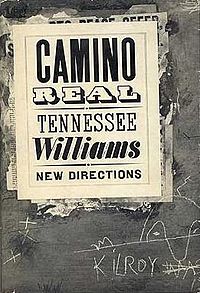Camino Real was written in 1952 while Tennessee Williams was living in Key West. It was not well-received and the bad reviews left Williams depressed. The play was dedicated to Elia Kazan who directed the Broadway production of A Streetcar Named Desire. I must say, I tried to find a performance I could watch from Youtube or download, without much luck. I am not sure this is a play that was meant to read. (Williams deals with this in an afterward to the published version where he says that reading the play will not improve the experience for those who did not like it performed.) Perhaps its magic is hidden in the performances. The first draft of Camino Real was called something like Ten Blocks on the Camino Real. The final version contained fifteen of these “blocks.” We are fortunate that Williams wrote a rather reflective forward to the published version of the play, which deals with some of the negative feedback he received and gives some guidance to interpretation. He explains that the main motif of the play was intended to be freedom.
My desire was to give these audiences my own sense of something wild and unrestricted like water in the mountains, or clouds changing shape in a gale, or the continually dissolving and transforming images of a dream. This sort of freedom is not chaos nor anarchy. On the contrary, it is the result of painstaking design, and in this work I have given more conscious attention to form and construction than I have in any work before. Freedom is not achieved simply by working freely. (743—744)
There so a lot of wisdom in there for libertarians who actual want to create a free society, and not just talk about it. What Tennessee Williams said he was after in Camino Real was a well-planned and thoughtfully-designed joyous experience of release.
The setting, which Williams insists is no real place but a separate existence, is an open plaza with a great deal of life and openness, but also a tension between vagabonds who pass through or well in the “Skid Row” part of the plaza and those on the luxury side. Class is not directly theorized in the play. It is just assumed as the context. Almost all of the characters in the play (and there are great many minor and significant) are from one or the other side of the town, or act as the gate keepers keeping the two separate. Many literary figures find their way into the play from Don Quixote, in the opening scene, to Jacque Casanova, a major character to takes on a role of a tramp.
All of the literary characters who take the stage in Camino Real have been pushed to the margins and are no longer really necessary for the world. Casanova, for instance, relies on remittance checks for survival. (Casanova is historical, no literary, but he has been internalized enough to work as an archetype.) Williams may be mourning the declining interest in this impressive gang of rebels and freethinkers.
The play read to me like a prolonged meditation on the freedom of mobility of the poor, marginalized, and criminalized against the restrictive forces of order. The central action of Block Six is about the efforts to capture the vagabond Kilroy. After dodging the police he says:
How do I git out? Which way do I go, which way do I get out? Where’s the Greyhound depot? Hey, do you know where the Greyhound bus depot is? What’s the best way out, if there is any way out? I got to find one> I had enough of this place. I had too much of this place. I’m free. I’m a free man with equal rights in this world! You better believe it because that’s news for you and you had better believe it! Kilroy’s a free man with equal rights in this world! All right, now, help me, somebody, help me find a way out. (780)
Help comes in the form of Esmeralda and the gypsies, but Kilroy ends the scene in the hands of the police. A very similar scene is acted out in the final block with a happier outcome. There Esmeralda give the following speech in praise of the vagabonds.
God bless all con men and hustlers and pitchmen who hawk their hearts on the street, all two-time losers who’re likely to lose once more, the courtesan who made the mistake of love, the greatest of lovers crowned with the longest horns, the poet who wandered far from his heart’s green country and possibly will and possibly won’t be bale to find his way back, look down with a smile tonight on the last cavaliers, the ones with the rusty armor and soiled white plumes, and visit with understanding and something that’s almost tender those fading legends that come and go in this plaza like songs not clearly remembered, oh, sometime and somewhere, let these be something to mean the word honor again! (839)
I guess that is as nice a place to stop as any. I am not sure what quite to make of Camino Real. I am interested in seeing it performed and would appreciate any leads.

